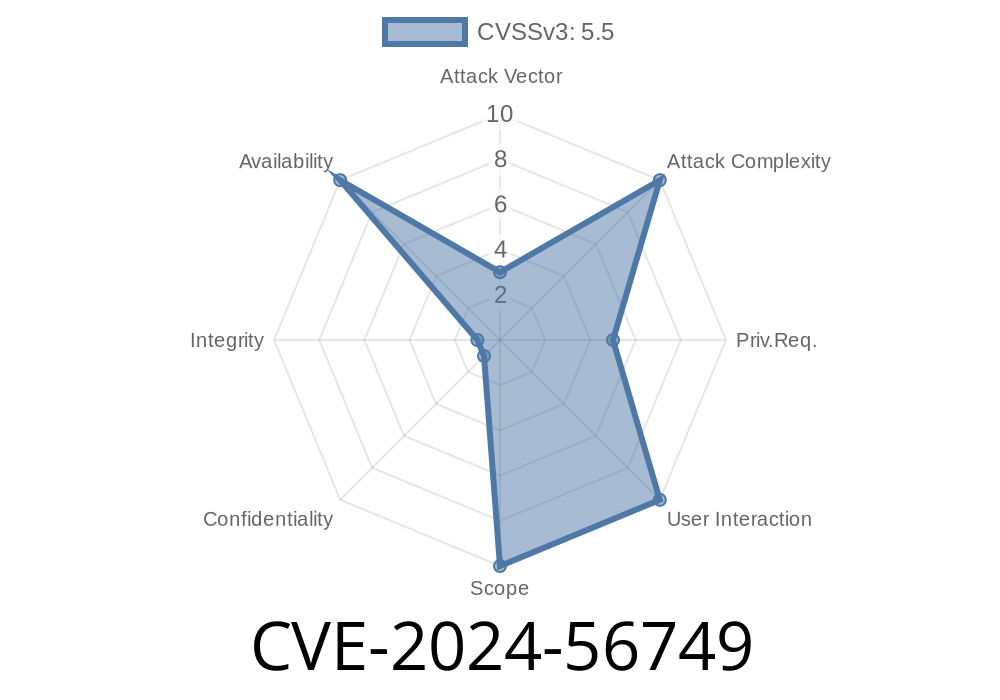A new security issue, CVE-2024-56749, was found and fixed in the Linux kernel’s Distributed Lock Manager (DLM) subsystem. This bug deals with a reference counting problem that happens during recovery in clustering environments. Let’s break down what this means, why it’s important, see a code snippet, and consider how an attacker might exploit it.
What Happened?
The DLM (Distributed Lock Manager) is used in cluster environments to coordinate shared resources. During cluster changes, such as nodes leaving or joining, a process called “recovery” must keep track of which nodes are part of the group.
The vulnerable function, dlm_recover_members(), tries to set up the new list of members. If something fails, it did not clean up references to a list called root_list. That list keeps references (pointers) to “rsb” objects, which are crucial internal structures.
Why does this matter?
Because when references aren’t released (reference counts aren’t dropped), memory isn’t freed. If this happens over and over (for example, if recovery is triggered repeatedly), it can lead to memory exhaustion — a resource leak! In some cases, persistent leaks like this can be abused to crash a system (a form of Denial-of-Service).
The Code Vulnerability
Here’s a simplified version of what happened. The function would create a root_list and add references to it, but if an error occurred, it would skip cleanup:
int dlm_recover_members(struct dlm_ls *ls)
{
struct list_head root_list;
int error;
INIT_LIST_HEAD(&root_list);
// ... some preparation and population of root_list ...
error = ping_members(ls, &root_list);
if (error) {
// Previously missing cleanup!
return error;
}
// ... more code ...
}
A correct fix (from the official patch) ensures that on error, the references are properly dropped, and the associated memory is freed. This avoids leaking memory and holding onto resources forever.
Linux clusters using DLM (often seen in GFS2, OCFS2, and other distributed filesystems).
- Any version of the kernel with the buggy implementation (see fix commit).
Trigger Cluster Recovery Loops:
A malicious (possibly privileged) user could repeatedly cause cluster recoveries by repeatedly joining/leaving or intentionally crashing a node.
Over time, the unfreed references in root_list consume kernel memory.
Denial-of-Service:
Once memory is exhausted — either the whole system, the cluster, or just the DLM subsystem — may become unresponsive or crash.
Assume you have a loop that repeatedly triggers recovery, e.g.
# Pseudocode for repeated recovery
while true; do
# Simulate node join/leave or cause DLM member changes
echo "Kicking recovery"
# Methods might include:
# - Detaching/attaching network interfaces
# - Unmount/remount cluster filesystems
# - Forcing node crashes in test lab
done
You’d monitor kernel memory with slabtop or cat /proc/meminfo to watch for increasing slab allocations or memory pressure, confirming the leak.
The Fix
Here’s the relevant snippet (from the official patch):
error = ping_members(ls, &root_list);
if (error) {
dlm_put_root_list(&root_list); // Frees up references
return error;
}
This single line ensures that on recovery failure, all references in root_list are properly cleaned up.
References
- CVE Page (if available)
- Linux kernel fix commit
- Patch mailing list discussion
- DLM documentation
Summary
CVE-2024-56749 is a classic example of how small mistakes in reference counting and error handling in complex systems like the Linux kernel can lead to potential security problems. This one allows for possible denial-of-service via memory exhaustion in cluster environments. The fix is small but important — and shows the value of careful resource management in system software.
Always keep your kernel up to date — especially on critical infrastructure like cluster filesystems!
*Exclusive Linux security insight by OpenAI’s Assistant*
Timeline
Published on: 12/29/2024 12:15:08 UTC
Last modified on: 01/06/2025 17:06:18 UTC
